Why I Want More Of Larian's Divinity: Dragon Commander In Baldur's Gate III
By ZombiePie 8 Comments
Preamble
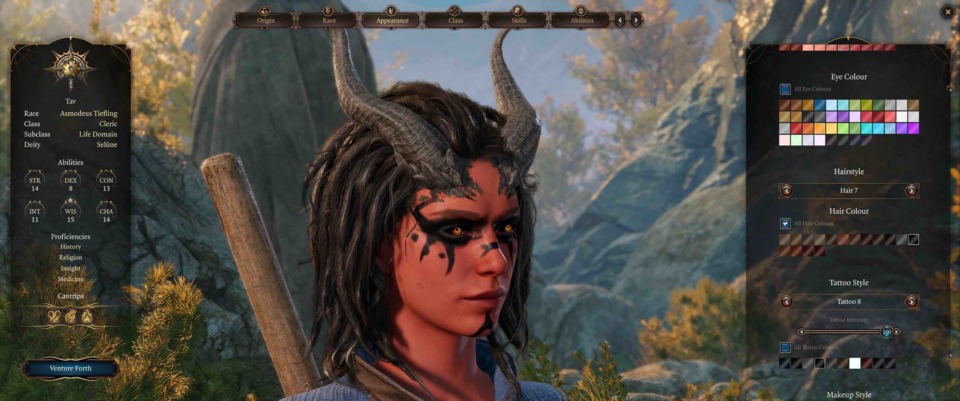
It would appear the much-ballyhooed Early Access release of Baldur's Gate III is upon us, and people's opinions of it have ranged the gamut. Some have found the game's "first act" to be a riveting outline of Larian's vision of a proper Baldur's Gate experience. Others have been more skeptical of the game's direction and emphasis on flashy action set-pieces. For reference, I fall somewhere in the middle. I enjoy the game's streamlined character creation suite and gritty art direction. However, the Early Access release doesn't effectively capture the spirit of the previous Baldur's Gate games due to its emphasis on combat and extended cinematic packages. Likewise, it is impossible to gauge how Larian is approaching character development or pacing from what they have released. And knowing Larian, the game will likely not be in the shape they, or fans for that matter, want until three or four months after its release.
Nonetheless, it is hard to fault Larian's approach to how they are "releasing" Baldur's Gate III as its soft-launch mimics the template Larian used for Divinity: Original Sin and Original Sin II. Which reminds me, I'm still in shock that Larian, the previous "doyenne of eurojank," is the studio tapped to make a numbered Baldur's Gate game. Indeed, they deserve all the credit in the world for what they accomplished in Original Sin 2. A game, mind you, many consider, myself included, a strong candidate as the best CRPG in the past ten years. Regardless, if you created a time machine and went back ten years, you'd be hard-pressed to think they would be the developer tasked to follow-up BioWare or Obsidian. Seriously, I double-dog dare you to play Beyond Divinity, look me in the eyes, and tell me that the developers of that game should be trusted with one of the most beloved CRPG franchises in video game history.
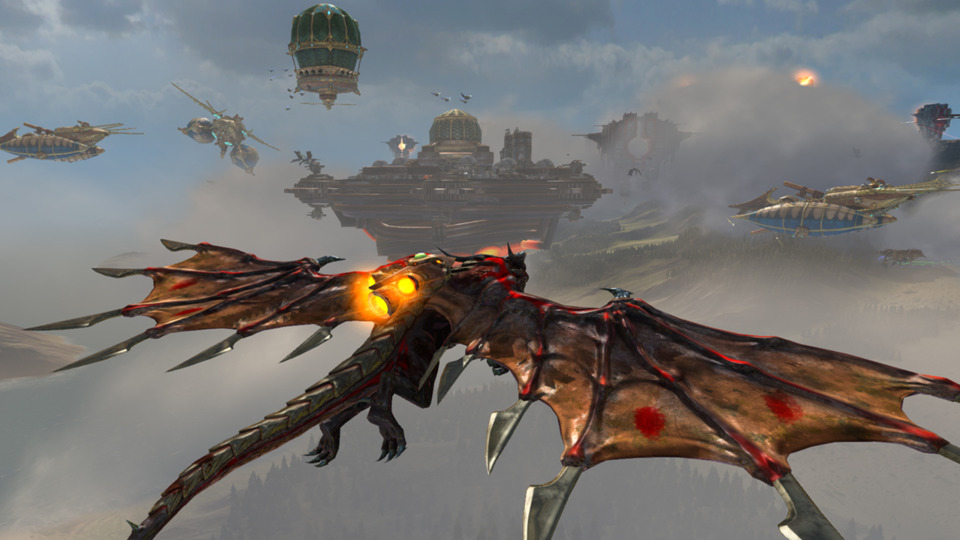
And now, we transition to the topic of my blog for today: Divinity: Dragon Commander. In my opinion, it is Larian's most admirable failure as a video game studio. Now, there's an interesting backstory to Dragon Commander in which Larian shit-canned its development in favor of Divinity: Original Sin, the evidence of which is pretty clear should you play it today. I fully admit Dragon Commander, when judged entirely from an objective lens, does not hold up. The RTS elements are downright awful, and the board game-based mechanics barely work as intended. It is a ROUGH video game experience, but it is one I continue to come back to after all these years. The game has all the ambition one could hope for from a small independent studio with an internal team of approximately thirty to forty personnel. More importantly, there are ideas and aspects in it I think Larian Studios should return to so they can inject some much need "soul" into BG3.
Claim #1: Dragon Commander's Political Compass System Is Vastly Superior To Tradition Alignments
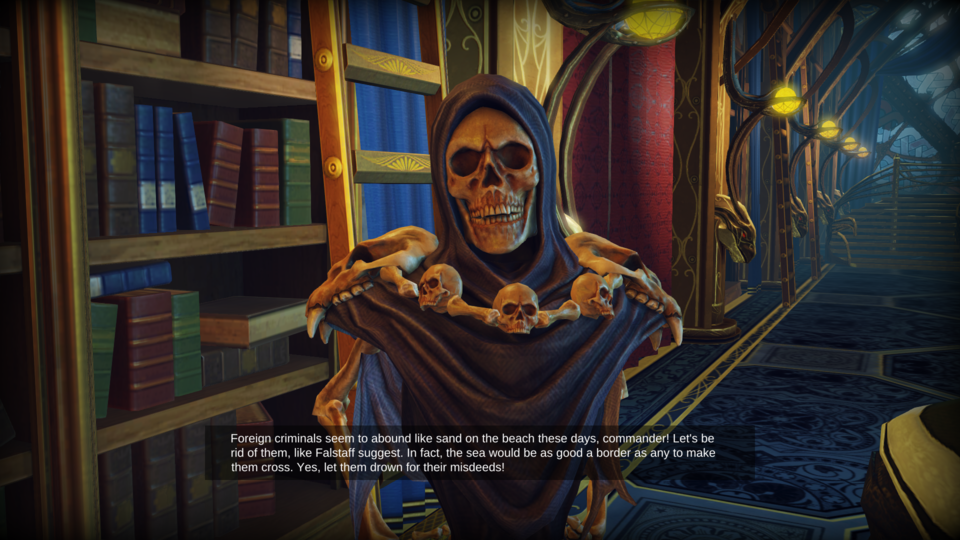
One rumor that came out of the pre-Early Access release of Baldur's Gate III involved supposed discussions between Larian and Wizards of the Coast about alignments. According to the story, Larian enthusiastically wanted to have alignments play a prominent role in Baldur's Gate III, and Wizards, predictably, poo-pooed their proposals. For those unaware, alignments have been "dead" since Dungeons and Dragons 5th Edition's release and exist as an ancillary legacy feature. Additionally, Wizards has only recently addressed the racially-coded origins of the mechanics after managing to dodge accountability for over ten years. So, Wizards' hesitance to make alignments a focal point makes sense. Unfortunately, the result is that Baldur's Gate III's sense of morality or ethics is mixed to dubious at times based on its Early Access release. There are not a ton of opportunities to engage in exciting player choices, and that feels like a bit of a misstep given this is Baldur's Gate, and that has been a significant appeal of every game bearing that namesake.
It is worth mentioning, Larian LOVES the idea of alignments. Over their twenty-five-year existence, they have played around with a variety of different approaches to the mechanic. In my opinion, the closest they have come to capturing all of the upsides of traditional D&D alignments, without any of the icky baggage is Dragon Commander. For those unaware, in Dragon Commander, all of the in-game races and cultures are mapped on a political compass and represent different codified real-world political and religious systems. For example, the undead represent the "religious right" and reward the player for following their spiritual dogma. In contrast, the goblins are technocrats that value player choices that further technological research and scientific progress. The critical distinction between this rather comical attempt to represent "modern" politics in a fantasy setting to a traditional alignment-based mechanic is that this system moves the player away from viewing their moral choices on a "good" versus "bad" spectrum. Instead, Dragon Commander challenges players to consider the qualities of each culture's code of ethics or morals based on their own merits, with arguments in support and against also included.
The primary benefit of this mechanic is immediately apparent. Even when you disagree with one of the representatives of another culture, you understand they are not innately "evil" or "good." Yes, the representatives of each of Dragon Commander's major races seek the player's approval in promoting their values across your realm. However, that's what makes the game's political jockeying more interesting than codifying the undead as "evil" and the elves as "good," as is the case with traditional alignments. Any rejection by the player is not necessarily an endorsement of "good" or "bad" but a determination of what fits in a heterozygous empire with plenty of diversity to boot. It's also a much more malleable system wherein the player can avoid feeling like they are min-maxed out of pursuing relationships with other strange bedfellows. In fact, the game actively punishes you for neglecting relations with any given race and often forces you to make decisions that fly contrary to your personal beliefs to maintain stakeholders in a shaky alliance. Without a doubt, it's an interesting system that has unfortunately never been utilized since its debut in Dragon Commander.
Claim #2: Dragon Commander Has A Consistent Tone With Plenty Of Levity
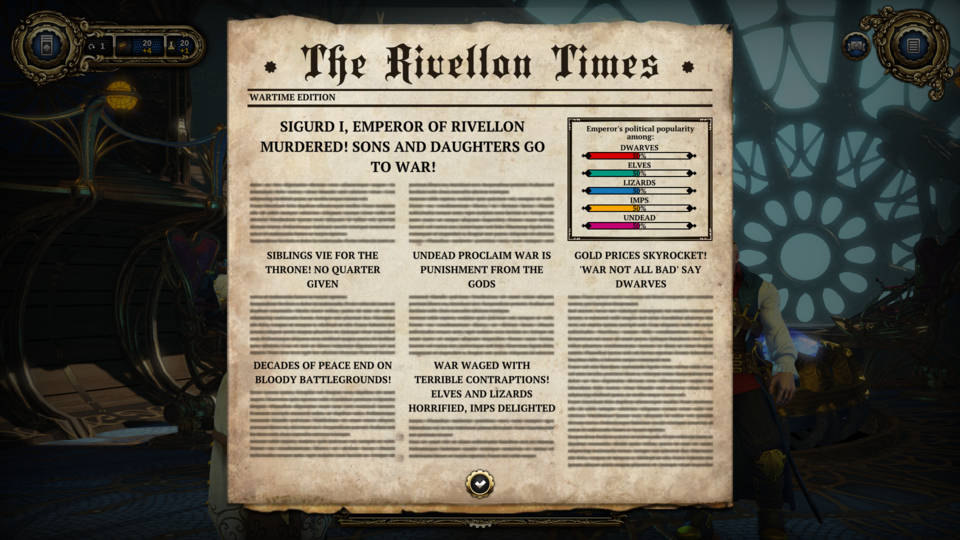
One of the recurring complaints about the current Early Access release of Baldur's Gate III is that it is hard to judge the direction Larian is taking with the game's tone. The game starts with mind flayers mounting a full assault at the legendary setting, but it is a gameplay-centric exhibition beyond that. Which, in all honesty, is to be expected as this mimics the initial releases of Original Sin 1 and 2. Larian prefers to show their mechanical "goods" before they provide a clear idea of what direction they are taking with their narratives. The issue is that this leaves long-time CRPG fans in the lurch as much of the nostalgia surrounding the previous Baldur's Gate games focuses on their stellar casts and riveting story pivots. If you wanted to know, my favorite Baldur's Gate game is Baldur's Gate II: Throne of Bhaal, and I might be one of twenty people in the world who prefer it to Shadows of Amn. Something about the plot twist in Throne of Bhaal has stuck with me after all these years. Speaking of which, I am skeptical Baldur's Gate III will attempt anything as grand as Throne of Bhaal, which leads me to my current concern Larian will not try anything ambitious in terms of storytelling in Baldur's Gate III.
In all honesty, Larian hasn't precisely been a studio known for their writing prowess. Original Sin 2 certainly has its moments, but it is a game plagued with pacing issues. Furthermore, the less said about OG Original Sin's wonky oscillations between dead-pan snark, drama, romance, and scatological humor, the better. However, with Dragon Commander, Larian shows that when they commit to a singular tone or focus, they can hit it out of the part in terms of characterization and worldbuilding. Despite the fact you never see any of the game's major races in their natural environments, as the game takes place almost entirely on an airship, you have a perfect idea of what their homelands look and feel like from the game's incredibly compelling dialogue. On top of that, Dragon Commander is a game that understands the need to insert levity following more dramatic set pieces or story pivots and not to take itself too seriously. Which, is another issue I have with what I have seen of Baldur's Gate III; the game takes its setting way too seriously and forgets about some of the previous game's goofier and light-hearted moments or characters.
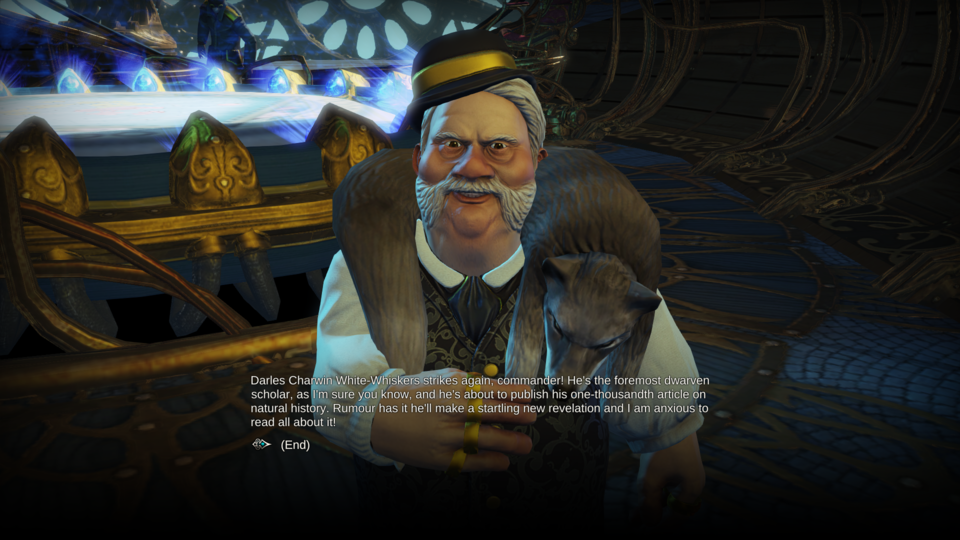
Stop and think about it, but who is the most beloved character in all of Baldur's Gate? If you were to poll any CRPG fan, nine times out of ten, they would say Minsc, and maybe you'll find a contrarian who goes with Montaron. And do you want to know why people love Minsc? Because he's a larger than life character whose anachronistic nature makes him stand out all the better. Shit, ask D&D fans to name their favorite Drow, and 99.99% of them will say, "Drizzt!" Tabletop and CRPG fans love it when you invert or defy their expectations with crazy or wacky characters! It's okay that Larian is trying to blaze their own path with Baldur's Gate III, but it would be a shame if they didn't realize the setting draws all tracks of people, including those who want to have a fun time. The world of Dragon Commander is decidedly steampunk-inspired. It is also one where goblins seek out new technological inventions, and the undead are busy handing out religious pamphlets as if they are Jehovah's Witnesses. The spoofs and parodies of real-world events are wild and occasionally groan-inducing, but Dragon Commander is a game that isn't afraid to wink at the camera from time to time. That is especially the case with the game's companions, who are an assemblage of inglorious bastards and level-headed pragmatists. However, Larian shows their skill with character-based storytelling by having these companions evolve throughout your adventure. Which reminds me...
Claim #3: Your Companions In Dragon Commander Have Complete Character Arcs Built Upon Player Choice
The generals and companions in Dragon Commander are as enjoyable as the ambassadors as they usually speak to you with blunt candor and have far more transparent character quirks. However, where Dragon Commander shines in terms of its characterization is how you play an integral role in transforming how these generals behave or act. In some cases, such as with Henry and Edmund, you even watch your companions adopt new world views or beliefs. Speaking of which, I want to take the time to recognize the fantastic voice acting in Dragon Commander. The voice acting talent in the game is over the top across the board, and that is to the game's benefit as they perfectly meld with the premise of Dragon Commander being a fantasy spoof of real-world events. In particular, I want to praise the voice actor for Edmund, who provides an absolute clinic that fully cements the lizard as one of the most lovable bastards in video game history.
While on the subject, let's spend some time discussing your confidants in Dragon Commander as they provide some of the best writing Larian has done outside of Original Sin 2. What they attempt with even their goofiest of characters is downright admirable. For example, take a character like Scarlett, who, throughout the story, challenges you to support LGBTQ issues, and should you comply with their requests, will come out as a lesbian. However, should you do the opposite, they remain an emotionally closeted character that never fully opens up to you. Henry is another character with one of the more nuanced evolutions in the game. He starts as your usual brash drunkard who enjoys charging straight into battle. Yet, as time marches on, you discover he's a single father, and the player is prompted to help him realize the world doesn't entirely revolve around himself. Should you challenge him to be more honest about his emotions, he begins playing off the other characters. In one situation, Scarlett pursues a relationship with him as a smokescreen to their homosexuality. After she opens up to everyone, Henry embraces her as a friend and recognizes there's more to life than sex and beer.
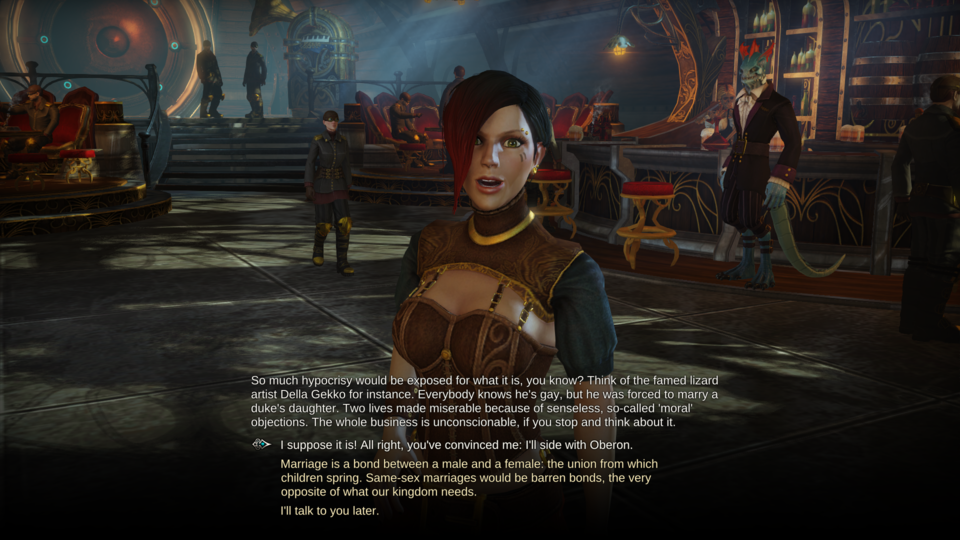
Dragon Commander also offers a small reform to a recurring issue I have always had with CRPGS. Most entries in the genre, Baldur's Gate included, are guilty of progressing your companions' character arcs without any prompting or agency provided to the player. Often in these cases, you move the story forward and need to talk to everyone in a hub world or otherwise risk missing an opportunity to learn more about them and their idiosyncrasies. An essential lesson from Dragon Commander is that it makes character-based moments a requirement and actively blocks your ability to play it any further until you have talked to critical NPCs. This point might sound like an annoyance, and it is primarily the reason why the game's middle-act slows to crawl. Nonetheless, this change to the standard CRPG formula ensures that the characters evolve to whatever pace you are playing the game, and their evolutions feel like an organic extension of your playthrough.
Claim #4: The Sultry Stuff Is "Fine," But Romances Should Surface Different Walks Of Life From Different Backgrounds
We now arrive at the most problematic mechanic in Dragon Commander: the romance options. So, let's get a few things out of the way. First, the player's only choice is to pursue a heteronormative arranged marriage with one of the game's major races. The only exception being the goblins whose princess candidate dies in an explosion before your "selection ceremony." Second, the princesses' designs are NOT GREAT, with most representing clear exploitations of the male gaze. Some of your romance options get worse as they become more scantily clad as they get more comfortable with you. In one such case, Ophelia, who starts as a skeleton princess, eventually becomes a busty vampire queen who refuses to wear a top. To make matters worse, the framing for your conversations with these characters is pulled out of an ecchi anime. The camera always manages to sneak in the plunging necklines and cleavages of your female companions, even if you are talking to them about global politics or scientific research.
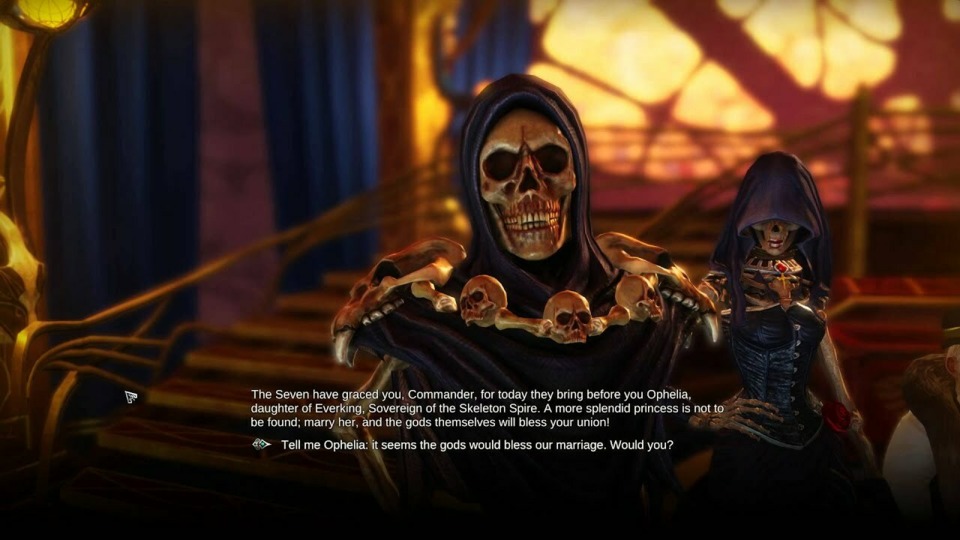
Luckily, things are not all doom and gloom when it comes to the romantic side of Dragon Commander. Each would-be bride provides a snapshot into the greater details about the game's governing races. Again, despite never setting foot off the game's hub, the conversations you have with these romantic companions fill in Dragon Commander's environmental gaps. More importantly, each bride depicts a different outlook or perspective in their respective culture than what your interactions with the ambassadors would suggest. By in large, every female companion in the game is an inverse of their culture's expectations and norms. Which, if you are wondering, presents an incredibly compelling dilemma to the player. Do you use your status and privilege to force your wife to conform to their society? Or, do you protect them and encourage their newfound independence? Again, each character is a snapshot into a different perspective, but more importantly, they force you to reconcile the contradictions in the dogma that guides the world of Dragon Commander. Though I cannot emphasize enough, the framing here is overwhelmingly patriarchal as these female companions need their husbands to defend them.
Let's run through a few romance options as a bit of a case study. With the elf princess Lohannah, she is immediately taken aback by your kingly riches, having lived a plain and simple life guided by elven statutes. In encountering plentiful food and other pleasures, she realizes that the high-elves' monastic lifestyle is bullshit and transforms into a pragmatic queen who can hold her own in a debate. You can reward this evolution by praising her, or you can spoon-feed her high-elf doctrine. Either way, her actions brand her a heretic. Your choice is to either court the favor of your council and burn her on the stake or stand by her and take a massive dent on your diplomatic relations. The dwarven princess, Aida, is also noteworthy. As you talk to Aida, you discover her father was abusive and dwarven society being incredibly patriarchal, did nothing to stop this abuse. Eventually, you find out her father is dying and needs a blood transfusion, and she is the only viable candidate. Yes, this situation is tired and true, but it melds together the gameplay and worldbuilding PERFECTLY. Her father is revealed to be a legendary warrior and slayer of orcs, and your ambassador promises his presence will significantly assist your campaign. However, Aida isn't having any of it and would rather see the man die, but defers to your judgment. We also have Ophelia, who is a skeleton princess with bone cancer, and you can either transform her into a vampire or cyborg. What can I say, DRAGON COMMANDER IS A GAME WITH CHOICES!
Final Word
I do not want to suggest Baldur's Gate III is terrible or that Dragon Commander is a perfectly comparable title. Dragon Commander is a bit too goofy for its own good, and Baldur's Gate III is trying to pine for a more dramatic and dire tone. That said, something about BG3 feels hallow to me, and I couldn't help but think Dragon Commander presents some viable solutions to this issue. Yes, part of this empty feeling stems from the game being in Early Access and Larian wanting players to toy with their mechanics and various character builds. But why not give players a better sense of the game's tone or story? Baldur's Gate, especially, is a game franchise carried by and large by its storytelling. Personally, I tolerate OG Baldur's Gate's tedious grind for wonderful characters like Minsc, Mazzy, and Jan Jansen. Were it not for these characters I would likely not feel as nostalgic for it as I do right now.
Before I put a close to this blog, I would be remiss to mention one irrefutable truth about Dragon Commander: it is janky as fuck. The game is brimming with potential and has the world and characters to accomplish something incredibly special. However, for a variety of reasons, it is a failure of a video game. Even with all of its novel ideas, it is downright inscrutable in parts and no goddamn fun to play. If this blog inspires you to try it, I strongly recommend you play it on its lowest difficulty setting or otherwise run afoul to its unforgiving campaign structure. To call this game a "diamond in the rough" is a bit too forgiving. Dragon Commander is a lump of coal with specks of shiny crystal you hope and pray are diamonds, but could likely be cubic zirconia. But you know what? Maybe that's precisely why you should play Dragon Commander. It's a broken mess with plenty of ideas that deserve a second shot; ideas I hope Larian revisit now that they are working with an established franchise and better budget. So, give it a try and see what the future might hold for Baldur's Gate III.
